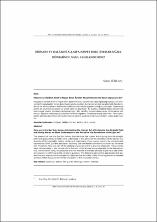| dc.contributor.author | Türcan, Selim | |
| dc.date.accessioned | 2019-10-22T08:13:47Z | |
| dc.date.available | 2019-10-22T08:13:47Z | |
| dc.date.issued | 2010 | en_US |
| dc.identifier.citation | Türcan, S. (2010). Hidâyet ve dalâleti Allah’a nispet eden ayetler nüzul döneminde nasıl algılanıyordu?. Hitit Üniversitesi İlahiyat Fakültesi Dergisi, 9(18), 83-97. | en_US |
| dc.identifier.issn | 2651-3978 | |
| dc.identifier.uri | https://hdl.handle.net/11491/4462 | |
| dc.description | research | en_US |
| dc.description.abstract | Hidayet ve dalâleti Allah’a nispet eden âyetlerin nüzul döneminde nasıl algılandığı konusu, bir zihniyet tarihi meselesidir. Anladığımız kadarıyla bu âyetler, Kur’an söyleminin karakteristik ifadelerindendir ve Müslümanların ilahî irade tarafından seçilmiş bir topluluk olduğunu ilan eder. Dolayısıyla politik bir söylemin parçasıdır ve pratik yönü ön plandadır. Bu âyetler, özellikle Mekke döneminde kulun özgür iradesi üzerinden tartışılmamıştır. Beri taraftan sonraki dönemlerde Müslümanlar söz konusu âyetlere referansta bulunurken farklı bir algılama ile hareket etmiş olabilirler. Tarihi perspektif, sonraki dönemlerin zihniyetini tasvire yönelik çalışmaları da nüzul dönemi kadar değerli görür. | en_US |
| dc.description.abstract | The question of how the Qur’ānic Verses that attribute the human Act of going onto the straight path and going astray to Allah were understood in the period of the revelation of the Qur’an is a question of the mentality history. As far as I understand, these verses seem to be characteristic expressions of the Qur’ānic discourse, declaring that the Muslim community is chosen by the divine will. Therefore, they are part of the political discourse and of a practical character. These verses were not discussed in the context of the free will of the human being especially in the Meccan period. On the other hand, it is probable that the Muslims in the later periods might have had different concerns in referring to the verses in question. The historical perspective appreciates the studies that are intended to investigate and describe the mentality of the following periods as valuable as those which focus on the mental character of the revelation period. | en_US |
| dc.language.iso | tur | en_US |
| dc.rights | info:eu-repo/semantics/openAccess | en_US |
| dc.subject | Hidayet | en_US |
| dc.subject | Dalâlet | en_US |
| dc.subject | Kur’an | en_US |
| dc.subject | Kelâm | en_US |
| dc.subject | Tarih | en_US |
| dc.subject | Metot | en_US |
| dc.title | Hidayet ve Dalâleti Allah'a nispet eden ayetler nüzul döneminde nasıl algılanıyordu? | en_US |
| dc.title.alternative | How were the Qur'anic Verses attributing the human Act of following the straight path and going astray to Allah understood in the period of the revelation of the Qur'an? | en_US |
| dc.type | article | en_US |
| dc.relation.journal | Hitit Üniversitesi İlahiyat Fakültesi Dergisi | en_US |
| dc.department | Hitit Üniversitesi, İlahiyat Fakültesi, Temel İslam Bilimleri Bölümü | en_US |
| dc.identifier.volume | 9 | en_US |
| dc.identifier.issue | 18 | en_US |
| dc.identifier.startpage | 83 | en_US |
| dc.identifier.endpage | 97 | en_US |
| dc.relation.publicationcategory | Makale - Ulusal Hakemli Dergi - Kurum Öğretim Elemanı | en_US |


















